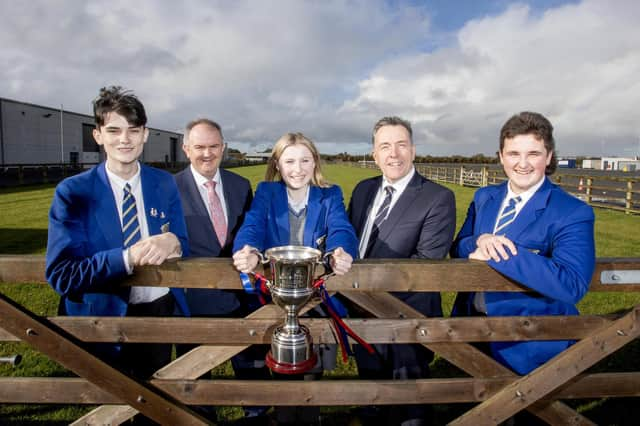Angus Youth Challenge winners look towards future career opportunities in agri-food sector


The good news is that the initiative, delivered by ABP in partnership with Certified Irish Angus, has consistently succeeded in achieving this aim, with the 2023 winners of the competition extolling this virtue in an extremely positive and meaningful way.
The school in question is St Killian’s College, Carnlough.
The winning team comprises Yr. 12 pupils: Emma Mitchell, Alex McAlister and Peter Agnew.
Advertisement
Advertisement


All come from beef and sheep backgrounds in the Glens of Antrim area.
In the case of Peter, it’s a mix of beef and sheep while Emma and Peter come from farms where breeding sheep represent the only enterprise.
Significantly, they are all working to secure a GCSE in agricultural science next summer, after which they hope to return to St. Killian’s to complete a two-year BTEC course in agriculture.
Obtaining this qualification represents a key stepping stone into third level education for the St Killian’s College students.
Advertisement
Advertisement
Alex hopes to study food science at the Loughry Campus of the College of Agriculture, Food and Rural Enterprise (CAFRE).
In Emma’s case, the plan is to study veterinary medicine while Peter is also considering a relevant third level course in agriculture.
The project completed by the three students during their final stage in the ABP Angus Youth Challengebrings together three of the key drivers that will deliver sustainability within local agriculture under the auspices of the subject areas: soil health, animal health and farmers’ mental health.
The over-arching title given to the assignment was: ‘A Health Approach to Agriculture’.
Peter explained:
Advertisement
Advertisement
“Each of the separate themes are inter-linked. Good soil health drives animal performance and profitability.
"And if farms are sustainable in this respect, this reduces the stress levels encountered by farmers."
Emma is the member of the team with a specific interest in farmers’ mental health.
She explained:
“Farming can be a very lonely profession.
"There is also a commitment on the part of those involved to put in long hours on an almost daily basis.
Advertisement
Advertisement
“As a result, these issues can impact on farmers’ mental health.
"But the good news is that help is available,” Emma further explained.
"Organisations like Rural Support are available to work with farmers and other family members, who might be experiencing mental health challenges.”
As part of the work undertaken, Emma spoke to a significant number of farmers on these matters.
Advertisement
Advertisement
She also got a first-hand perspective on how rural support agencies interface with farming families in that all-important practical way.
“These are very complex issues.
"But their research indicated that there are two fundamental drivers coming into play: encouraging farmers to talk about stress related issues and better profiling the support that is available to them."
Alex addressed the issue of soil health.
He explained:
“The health of our soils underpins the production capacity of every farm. And it is set to become an issue of even greater importance as agriculture faces-up to the challenge posed by climate change.”
Alex’s work has clearly confirmed the need for farmers to regularly sample and test their soils.
Advertisement
Advertisement
“At a very fundamental level, this will allow farmers to identify the pH value of their soils.
"This is a key indicator of soil health and the productive capacity of all soils.”
Peter agrees:
“Soil health determines how much grass can be grown within a specific field and, more importantly, how efficiently it can be produced.
“Grazed grass is our cheapest feed source.”
All three agreed that their project has confirmed the unifying bond that does exist between soil, animal and farmers’ mental health.
Advertisement
Advertisement
In a way it comes back to the three-legged stool principle: if one leg falls-off, the stool does not function.
The team concluded that they believe a very positive future lies ahead for agriculture in Northern Ireland.
Emma, Peter and Andrew worked closely with their agricultural science teacher, Maeve Duggan, at all stages during the development of their submission to the judges .
“The school has been absolutely buzzing since the confirmation of the competition results,” Maeve explained.
Advertisement
Advertisement
“First off, I would like to congratulate Emma, Peter and Andrew on their achievement. It was thoroughly deserved.
“Their success has encouraged two teams from the school to enter a submission for the 2023-2024ABP Angus Youth Challenge.
She added:
“Agricultural Science has increased in popularity as a GCSE subject here at the school.
"It is a tremendous qualification to have in its own right,” added Maeve.
Advertisement
Advertisement
“But it also opens the door for students to then study for a BTEC in agriculture, which is equivalent to a full ‘A’ Level qualification.
“We have a lot of students at the school who now want to follow a career in farming and food.
" All of this is very positive.”
A sense of pride and responsibility
All three members of the St Killian’s team impressed the judges of the 2022 Angus Youth Challenge Award with their sense of pride and responsibility in carrying on the agriculture traditions of the Glens of Antrim.
They demonstrated real leadership by bringing their year-long assignment ‘A Health Approach to Agriculture’ to life with the help of their CAFRE mentor Sineád Mathers.
Advertisement
Advertisement
Alongside their project the team also had to rear five Angus cross calves through to beef and sell them to ABP at a profit.
The pupils recently received the ABP Angus Youth Challenge Cup and a £1,000 cheque from Managing Director of ABP in Northern Ireland, George Mullan and the General Manager of the Certified Irish Angus Producer Group, Charles Smith.
The three students intend to reinvest their prize money into furthering agricultural studies at their school.
Congratulating the award winners George Mullan said:
“As a leading employer and business partner within Northern Ireland’s farming and food sector, ABP is committed to supporting ambitious young people make the transition from education to working in our sector.
Advertisement
Advertisement
“The ABP Angus Youth Challenge provides practical experience to support this study and career choice within schools.
“By completing the Challenge, our Class of 2022 have gained many strengths and relevant work-life skills which should stand them in good stead for their future studies and beyond school.”
Summary of the St Killian’s project
Alex, Emma and Peter focused on the theme: ‘A Health Approach to Agriculture’.
They divided this theme into the subtopics of farmer mental health, animal health, and soil health.
Advertisement
Advertisement
Their primary goal was to examine how each of these three areas interacted with each other and promote sustainability and well-being within the farming environment.
They initiated their project by conducting soil sampling on selected fields of their school farm, with guidance from their CAFRE mentor, Sineád Mathers.
To expand their message's reach, they involved their GCSE Agricultural Science class in their research and experiments by measuring water infiltration and soil characteristics on the school farm.
This, in turn, led to discussions on the necessary management practices for their specific soil and farm type.
Advertisement
Advertisement
The project's success prompted the group to establish an Eco Club within their school community, attracting over 30 members across various year groups.
They later embarked on their next endeavour, the Heart of the Glens Festival, bringing three of their Angus cattle to the show to conduct a survey on farmer mental health.
Notably, the survey identified two significant challenges: the isolation of working alone, affecting over 80% of respondents, and the negative impact of sleep deprivation on farming ability.
Even though all three students work on their own family farms they recognised that all of their fathers mainly worked alone so they should know more about the supports that are available to them.
Advertisement
Advertisement
This concern was echoed in their research findings, revealing that over 65% of farmers were unaware of where to seek help for mental health issues.
Consequently, the students dedicated themselves to raising awareness about organisations like Rural Support and You Matter.
What the judges said
The judges were immensely impressed by the enthusiasm of this group. Their pride of place coupled with their passion for farming traditions within an area of exceptional beauty is deep rooted.
Their sense of responsibility to protect and enhance their surroundings, while at the same time ensuring the farming traditions of their ancestors are maintained and valued by the wider community, was most impressive.
Advertisement
Advertisement
Through the establishment of an ECO Club in school they disseminated the findings of their ABP Angus Youth Challenge journey.
With the help of their teachers and their CAFRE mentor they showed how improved soil health benefitted the glens while at the same time delivered quality feed for livestock with fewer inputs, shows real vision.
Contentment among farmers within their community was improved when their farming practices were in tandem with nature, a survey conducted by the group established.
Finally bringing together all of these findings and communicating them to a large section of the public at the “Heart of the Glens Festival” showed real leadership and entrepreneurial skills and makes St Killian’s College admirable winners.
So what is the ABP Angus Youth Challenge?
Advertisement
Advertisement
The competition requires participating schools to demonstrate a unique mix of business acumen, innovation and flair while – at the same time – getting the chance to actually work with Aberdeen-Angus cattle.
The Angus Youth Challenge has been a tremendous success.
Interest from schools wanting to participate just continues to grow.
From the very outset, ABP and Certified Irish Angus recognised the potential of the award scheme to promote the potential for young people to work to get actively involved in production agriculture and the food processing industry.
Meanwhile, the scope of the career opportunities within both sectors continues to expand.
Advertisement
Advertisement
The annual Angus Youth Challenge is also highlighting the value of beef in the diet to young consumers.
Specifically, the ABP Angus Youth Challenge works to ensure that young people could gain skills and a practical experience within the farming and food industries.
The competition attracts a diverse range of entrants and is open to rural, urban, farming and non-farming teenagers alike.
Through a year-long journey, successful finalists are challenged to research farming and food production methods that can meet the changing needs of the marketplace with minimal impact on the environment.
Advertisement
Advertisement
They also get to put these principles into practice with their own mini-herd of Angus cross calves to rear and sell, learning about the dynamics of a modern beef industry, with the added bonus of an expert CAFRE mentor supporting them along the way.
All of this takes place against the backdrop of training opportunities to develop knowledge and skills that will stand the students in good stead for the world of work.